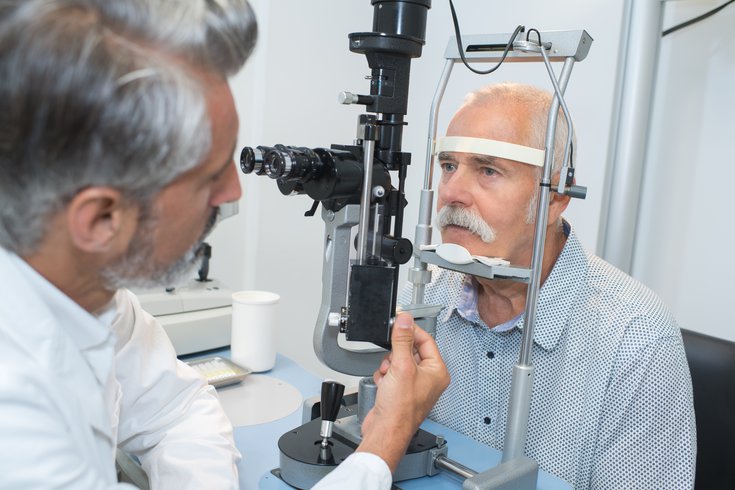
February 28, 2023
 Source/Image licensed from Ingram Image
Source/Image licensed from Ingram Image
A diet rich in fruits and vegetables, especially dark leafy greens such as spinach and kale, can help reduce the risk of age-related eye diseases.
The risk of developing eye disease and vision loss generally increases with age, but there are ways to reduce the natural effects of aging, health experts say. Even certain foods and drinks can have an impact on eye health.
Many people grew up hearing a similar refrain from their parents: "Eat your carrots because they are good for your eyes." But the directive should extend beyond carrots. A diet rich in fruits and vegetables, especially dark, leafy greens like spinach and kale, is essential for good eye health.
Research has shown that green, leafy and brightly colored vegetables are packed with important nutrients, including carotenoids such as lutein and zeaxanthin. These two nutrients may help protect the eyes against macular degeneration and cataracts. They help filter blue rays in the eyes, preventing retinal damage.
Eating fish high in omega-3 fatty acids – like salmon, tuna and halibut – also protect vision by reducing ocular surface inflammation that can lead to dry eye disease or age-related macular degeneration, studies show.
There also are foods that can be indirectly harmful to the eyes. That's because health conditions like high cholesterol, heart disease and diabetes can affect vision by causing plaque buildup in the tiny blood vessels
It is important to limit consumption of processed foods that are high in saturated fat or sugar, which contribute to conditions like heart disease and diabetes. One study found that patients at risk for age-related macular degeneration – damage to the central part of the retina – may be able to reduce their risk by eating fewer simple carbs, which can be found in candy, syrup, table sugar and soft drinks.
Sodium, condiments and dressings, sweetened drinks and alcohol also can be harmful to the eyes.
One beverage for which research hasn't been conclusive is coffee. Scientists are still unclear whether coffee is "good" or "bad" for the eyes. Some research suggests that drinking too much coffee can increase the risk of glaucoma if a person has a family history of it, but there is no direct evidence that coffee causes glaucoma or blindness.
In a 2012 study, researchers found that drinking at least three cups of caffeinated coffee each day increased the risk of glaucoma, especially among women with a family history. A 2020 study found the same association, but among men and not women. And a 2021 study didn't find any relationship between drinking coffee and glaucoma overall. They did find though an increased risk among people who consumed more than 321 mg of caffeine each day and were genetically at risk to have higher eye pressure.
One theory behind the higher risk for glaucoma is that caffeinated coffee increases the pressure in the eyes, constricts blood vessels and reduces blood flow. This increases the risk of optic nerve damage.
Other research has found that drinking coffee may provide benefits to the eyes. Some studies have found it reduces the risk of cataracts, because one of the chemicals generated in the roasting process helps limit oxidative stress and protects the lens of the eyes. Some preliminary studies also indicate that caffeine may protect against retinal disease.
More than 4.2 million Americans age 40 and older are either legally blind or have low vision, according to the U.S. Centers for Disease Control and Prevention. The leading causes are mostly age-related eye diseases such age-related macular degeneration, cataracts, diabetic retinopathy and glaucoma.
Macular degeneration is damage to the macula lutea, the small, yellowish central part of the retina. It is the part of the eye responsible for sharp, clear central vision and necessary for daily tasks such as reading and driving, and the ability to perceive color.
Cataracts, a clouding of the eye's lens, are the leading cause of vision loss in the United States. Cataracts can occur at any age and can be present at birth.
Diabetic retinopathy is progressive damage to the blood vessels of the retina caused by diabetes. It is the leading cause of blindness in American adults.
Glaucoma is a group of conditions that damage the optic nerve, leading to vision loss and blindness. Researchers are still trying to understand the link between eye pressure and glaucoma.
Besides eating a healthy diet, there are other preventative measures that people can take to protect their vision from eye disease. Here are some tips from Healthline, the CDC and Everyday Health.
• Exercise regularly and maintain a healthy to reduce the risk of heart disease and diabetes.
• Keep blood sugar levels stable. The CDC says 90% of diabetes-related blindness is preventable.
• Get regular eye exams. The American Optometric Association offers recommendations on how often people should get evaluated.
• Know your family history of eye disease.
• To reduce the risk of eye injury, wear protective eye gear when playing sports and when doing work that might be dangerous to the eyes.
• Wear sunglasses and put on sunscreen when outside to reduce UV damage to the eyes and the skin around them.
• Stop smoking.
• Reduce eyestrain by taking regular breaks from screens. The CDC recommends following the 20-20-20 rule: For every 20 minutes you are on your computer, look 20 feet in front of you for 20 seconds.